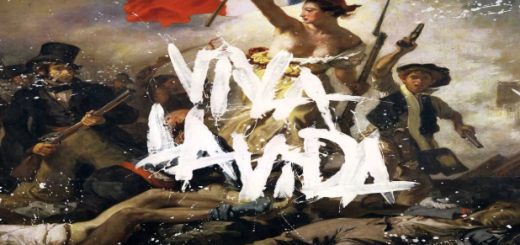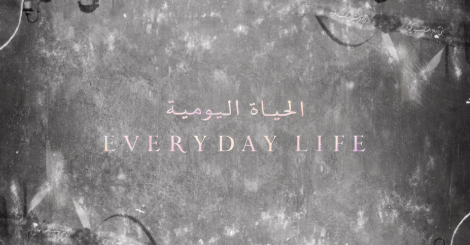Viva la Vida by Coldplay Lyrics Meaning – The Spiraling Arc of Power and Hubris
Lyrics
Seas would rise when I gave the word
Now in the morning, I sleep alone
Sweep the streets I used to own
I used to roll the dice
Feel the fear in my enemy’s eyes
Listen as the crowd would sing
Now the old king is dead, long live the king
One minute, I held the key
Next the walls were closed on me
And I discovered that my castles stand
Upon pillars of salt and pillars of sand
I hear Jerusalem bells a-ringin’
Roman Cavalry choirs are singin’
Be my mirror, my sword and shield
My missionaries in a foreign field
For some reason, I can’t explain
Once you’d gone, there was never, never an honest word
And that was when I ruled the world
It was a wicked and wild wind
Blew down the doors to let me in
Shattered windows and the sound of drums
People couldn’t believe what I’d become
Revolutionaries wait
For my head on a silver plate
Just a puppet on a lonely string
Aw, who would ever wanna be king?
I hear Jerusalem bells a-ringin’
Roman Cavalry choirs are singing
Be my mirror, my sword and shield
My missionaries in a foreign field
For some reason, I can’t explain
I know Saint Peter won’t call my name
Never an honest word
But that was when I ruled the world
Oh-oh-oh, oh-oh, oh
Oh-oh-oh, oh-oh, oh
Oh-oh-oh, oh-oh, oh
Oh-oh-oh, oh-oh, oh
Oh-oh-oh, oh-oh, oh
I hear Jerusalem bells a-ringin’
Roman Cavalry choirs are singin’
Be my mirror, my sword and shield
My missionaries in a foreign field
For some reason I can’t explain
I know Saint Peter won’t call my name
Never an honest word
But that was when I ruled the world
Coldplay’s magnum opus, ‘Viva la Vida’, resonates with an epic cadence that has reverberated through time since its release in 2008. The song, which became an anthem for many, holds under its enchanting melody a profound narrative of rise and fall, a universal tale about the ephemeral nature of power and glory.
As we peel back the layers of ‘Viva la Vida’s poetic veneer, the song unfolds much like a weathered tome of ancient history, providing a window into the soul of a fallen ruler reflecting on their reign. Absorbing the gravity of its lyrics and the emotions harnessed within the orchestral swells, we find a piece that is both a celebration and eulogy for a time gone by.
From Majesty to the Streets: The Tumultuous Downfall
The song’s opening lines, ‘I used to rule the world / Seas would rise when I gave the word’, instantly establish a former sovereign, the omnipotent and exalted. The stark contrast with the protagonist’s present, ‘Now in the morning, I sleep alone / Sweep the streets I used to own’, masterfully portrays the precipitous decline from splendor to solitude, a humbling turn of fortunes that echoes throughout human history.
Coldplay does not just paint a picture of this downfall; they encapsulate a palpable sense of loss, the haunting specter of power once held, and now nothing but a memory. This loss is articulated through the vivid imagery of greatness reduced to the menial task of street-sweeping, a task so far removed from the regal bearing that it borders the realm of allegory.
The Evanescent Empire: A Reflection on Legacy
Referencing castles standing atop ‘pillars of salt and pillars of sand’, the song conveys the inherent fragility of legacy and the illusory foundation upon which many empires are built. It challenges the notion that monuments and conquests are imperishable, instead suggesting that they may crumble as easily as granules trickling through time.
Coldplay’s melodic introspection offers a ubiquitous lesson on the impermanence of power. The lyrics imply a self-awareness from the ruler character, realizing their monuments may not withstand the proverbial and literal tides of change, a humbling reminder that even seeming invincibility is subject to erosion.
The Choirs of Conquest and the Masks of War
Embodied within the lyrics, ‘I hear Jerusalem bells a-ringin’ / Roman Cavalry choirs are singin”, is the glory of military triumphs and religious zeal; yet there’s a subtler narrative at play. Through the melding of these symbols—the bells and choirs—Coldplay hints at the often entwined dance of organized faith and empire.
Yet the grandeur of these lines prophesies a darker undertone—a harbinger of the eventual coup that awaits the ruler. The bells and choirs, once emblematic of triumph, could just as easily ring out the end of a reign, marking the transition from ruler to reviled.
Unraveling the Song’s Hidden Meaning: The Labyrinth of Reflection
There’s a cryptic veil to the line, ‘For some reason, I can’t explain / Once you’d gone, there was never, never an honest word’. The ambiguity leaves us pondering about the entity that’s gone—is it the divine favor, the trust of the people, or the ruler’s own integrity? The phrase ‘never an honest word’ evokes a court once filled with deceit, perhaps a reference to the duplicity of political courts.
While some interpretations find religious connotations—imagery of St. Peter and the prospective denial at the gates of Heaven—it is this veiled rumination that grounds ‘Viva la Vida’ in the realm of the philosophical. It urges us to consider the isolation that comes with leadership and the ultimate cost of ruling.
Echoes of Power in Memorable Lines: The Haunting Retrospection
‘Revolutionaries wait / For my head on a silver plate’—these words capture the zeitgeist of historical revolutions, an unsettling reminder that power is not only fleeting but that its conclusion often comes with violent reprisal. It is a narrative of caution, immortalized in Coldplay’s musical canvas.
‘Just a puppet on a lonely string / Oh, who would ever want to be king?’ These rhetorical musings offer a twist to the perceived desirability of monarchic rule, flipping the script to reveal the often-harrowing reality of leadership. Through this introspection, ‘Viva la Vida’ establishes itself as a modern meditation on the ancient and enduring theme of power’s cruel paradox.








